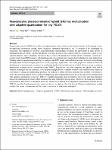Item Infomation
Full metadata record
| DC Field | Value | Language |
|---|---|---|
| dc.contributor.author | Tao, Li | - |
| dc.contributor.author | Yitao, Ma | - |
| dc.contributor.author | Tetsuo, Endoh | - |
| dc.date.accessioned | 2023-04-25T03:49:26Z | - |
| dc.date.available | 2023-04-25T03:49:26Z | - |
| dc.date.issued | 2023 | - |
| dc.identifier.uri | https://link.springer.com/article/10.1007/s00521-023-08280-y | - |
| dc.identifier.uri | https://dlib.phenikaa-uni.edu.vn/handle/PNK/8271 | - |
| dc.description | CC BY | vi |
| dc.description.abstract | Deep neural networks (DNNs) have delivered unprecedented achievements in the modern Internet of Everything society, encompassing autonomous driving, expert diagnosis, unmanned supermarkets, etc. It continues to be challenging for researchers and engineers to develop a high-performance neuromorphic processor for deployment in edge devices or embedded hardware. DNNs’ superpower derives from their enormous and complex network architecture, which is computation-intensive, time-consuming, and energy-heavy. Due to the limited perceptual capacity of humans, accurate processing results from DNNs require a substantial amount of computing time, making them redundant in some applications. Utilizing adaptive quantization technology to compress the DNN model with sufficient accuracy is crucial for facilitating the deployment of neuromorphic processors in emerging edge applications. | vi |
| dc.language.iso | en | vi |
| dc.publisher | Springer | vi |
| dc.subject | DNNs | vi |
| dc.subject | DNNs’ superpower | vi |
| dc.title | Neuromorphic processor-oriented hybrid Q-format multiplication with adaptive quantization for tiny YOLO3 | vi |
| dc.type | Book | vi |
| Appears in Collections | ||
| OER - Công nghệ thông tin | ||
Files in This Item:

